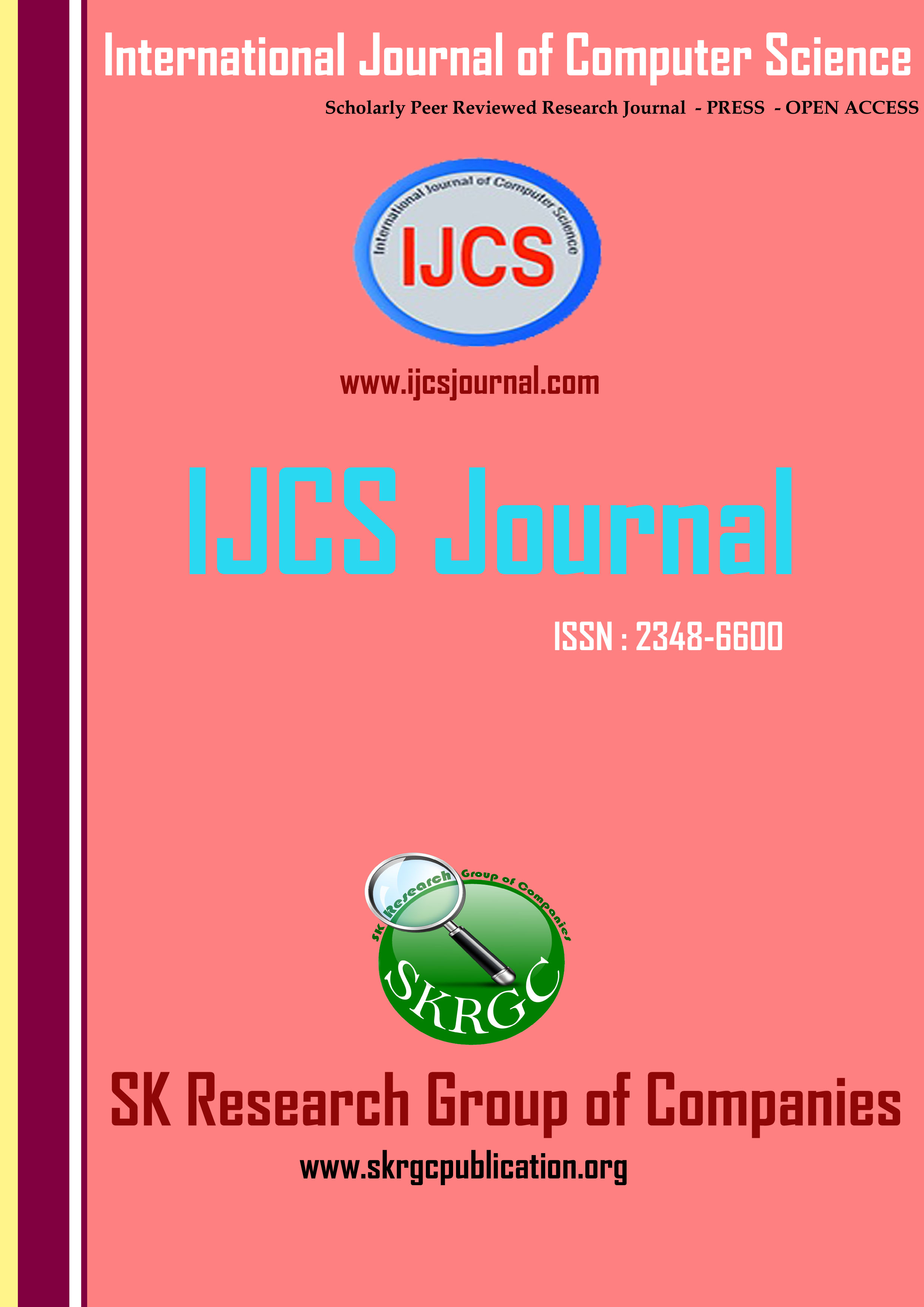A STUDY ON SHIFTING MANAGEMENT FOCUS FROM MAN-BASED TECHNOLOGY TO THE DIGITAL-BASED TECHNOLOGY
International Journal of Computer Science (IJCS) Published by SK Research Group of Companies (SKRGC)
Download this PDF format
Abstract
Digital transformation is the most common way of utilizing digital technologies to make new or alter existing business cycles, culture, and client encounters to meet changing business and market requirements. This rethinking of business in the digital age is digital transformation. It transcends customary jobs like deals, advertising, and client assistance. All things considered, digital transformation starts and finishes with your thought process about, and draws in with, clients. As we move from paper to accounting sheets to savvy applications for managing our business, we get the opportunity to rethink how we carry on with work how we draw in our clients with digital technology on our side. Digital transformation is the incorporation of digital technology into all region of a business, fundamentally changing how one work and convey worth to clients. Likewise a social change expects organizations to ceaselessly rock the boat, experiment, and become familiar with disappointment. Digital transformation is basic for all organizations, from the little to the venture. That message comes through distinctly from apparently every featured discussion, board conversation, article, or study connected with how organizations can stay serious and significant as the world turns out to be progressively digital. Since digital transformation will appear to be unique for each organization, pinpointing a definition that applies to all can be hard. Notwithstanding, overall terms, we characterize digital transformation as the combination of digital technology into all region of a business coming about in fundamental changes to how organizations work and how they convey worth to clients. Past that, a social change expects organizations to constantly rock the boat, experiment frequently, and become familiar with disappointment. This occasionally implies leaving well established business processes that organizations were based upon for moderately new practices that are as yet being characterized. Hence, the author has done this research study to overview the shifting management focus from man-based technology to the digital-based technology.
References
1. Adegunwa, Olajide & Ogunjimi, L. (2022). DIGITAL TECHNOLOGY ADOPTION IN THE CONTEXT OF ASSET MANAGEMENT Entire Paper-SEP 2021.
2. Averina, Tatyana & Barkalov, Sergey & Fedorova, Irina & Poryadina, Vera. (2021). Impact of digital technologies on the company’s business model. E3S Web of Conferences. 244. 10002. 10.1051/e3sconf/202124410002.
3. Bakri, Mohamad. (2019). From Traditional to Digital Environment: An Analysis of the Evolution of Business Models and New Marketing Strategies. Management Studies and Economic Systems. 4. 225-240. 10.12816/0054689.
4. Cartwright, Phillip & Andal-Ancion, Angela & Yip, George. (2003). Digital Transformation of Traditional Businesses. MIT Sloan Management Review. 44. 34-41.
5. Cascio, Wayne & Montealegre, Ramiro. (2016). How Technology Is Changing Work and Organizations. Annual Review of Organizational Psychology and Organizational Behavior. 3. 349-375. 10.1146/annurev-orgpsych-041015-062352.
6. Ciarli, Tommaso & Kenney, Martin & Massini, Silvia & Piscitello, Lucia. (2021). Digital technologies, innovation, and skills: Emerging trajectories and challenges. Research Policy. 50. 104289. 10.1016/j.respol.2021.104289.
7. Dhondt, Steven & van der Zee, Frans & Preenen, Paul & Kraan, Karolus & Oeij, Peter. (2019). Dominant Technology and Organization: Impact of Digital Technology on Skills. 10.1201/9781003337928-12.
8. Fogoro?, Teodora & Maftei, Mihaela & Olaru, Stelian & Bi?an, Gabriela. (2020). From Traditional to Digital: A Study on Business Models in The Context of Digitalization. 10.2478/9788395815072-074.
9. Ghorbani, Yousef & Zhang, Steven & Nwaila, Glen & Bourdeau, Julie. (2022). Framework components for data-centric dry laboratories in the minerals industry: A path to science-and-technology-led innovation. The Extractive Industries and Society. 10.1016/j.exis.2022.101089.
10. Kern, Eva-Maria & Hegering, Heinz-Gerd & Bruegge, Bernd. (2006). Managing development and application of digital technologies: Research insights in the munich Center for Digital Technology & Management (CDTM). 10.1007/3-540-34129-3.
11. Khin, Sabai & Ho, Theresa. (2018). Digital technology, digital capability and organizational performance: A mediating role of digital innovation. International Journal of Innovation Science. 11. 10.1108/IJIS-08-2018-0083.
12. Kraus, Sascha & Durst, Susanne & Ferreira, João J. & Veiga, Pedro & Kailer, Norbert & Weinmann, Alexandra. (2021). Digital transformation in business and management research: An overview of the current status quo. International Journal of Information Management.63. 10.1016/j.ijinfomgt.2021.102466.
13. Obukhova, Anna & Merzlyakova, Ekaterina & Ershova, Irina & Karakulina, Kristina. (2020). Introduction of digital technologies in the enterprise. E3S Web of Conferences. 159. 04004. 10.1051/e3sconf/202015904004.
14. Pousttchi, Key & Gleiß, Alexander & Buzzi, Benedikt & Kohlhagen, Marco. (2019). Technology Impact Types for Digital Transformation. 487-494. 10.1109/CBI.2019.00063.
15. Ramnarayan, S & Mehta, Sunita. (2020). Leading Digital Transformation in Traditional Organizations.
16. Rayasa, Akmaeva & Aytpaeva, Aygul & Glinchevskiy, Edvard & Zhautikov, Bakhyt. (2020). Development of Management in the Digital Era. 10.2991/aebmr.k.200509.082.
17. Siachou, Evangelia & Vrontis, Demetris & Trichina, Eleni. (2020). Can traditional organizations be digitally transformed by themselves? The moderating role of absorptive capacity and strategic interdependence. Journal of Business Research. 124. 10.1016/j.jbusres.2020.11.011.
18. Ungureanu, Alexandra. (2021). Digital economy. the conversion of the traditional economy as a consequence of the ICT innovations. Journal of Social Sciences. IV(1). 10.52326/jss.utm.2021.4(1).02.
19. Vetitnev, Alexandr & Maznichenko, M & Lopatinskiy, D & Aksenov, I. (2020). Traditional and digital technologies in professional education: integration opportunities. Journal of Physics: Conference Series. 1691. 012135. 10.1088/1742-6596/1691/1/012135.
20. Xia, Huosong & Ye, Peiwen & Jasimuddin, Sajjad & Zhang, Justin. (2022). Evolution of digital transformation in traditional enterprises: evidence from China. Technology Analysis & Strategic Management. 1-21. 10.1080/09537325.2022.2124909.
Keywords
Man-based Business Model, Digitized Business, Integrative Digital Technology, Digital Transformation, Digital Business Process and Shifting Paradigm.

